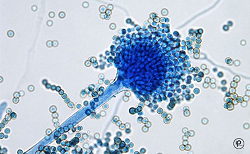Lecture Overview
In this lecture, Dr. Hooper introduces us to the fascinating world of human gut microbiota; the microorganisms that live within our bodies. Although we may think that most bacteria are harmful, Hooper provides ample evidence that symbiotic gut microbes are important to good human health. Her lab is interested in understanding how the gut microbiota changes during illness or disease and how it influences our ability to fight infections. Using germ-free mice, they were able to demonstrate that a healthy gut microbiota can shape development of the host immune system and provide protection against dangerous infections like salmonella.
In the second part of her talk, Hooper explains how the balance of organisms in the gut microbiota is maintained. By comparing DNA microarray data from normal mice and germ-free mice, Hooper’s lab was able to look for genes induced by the gut microbiota. They identified RegIIIγ, an important protein involved in the protection against pathogenic bacteria. They showed that RegIIIγ forms pore complexes in the membranes of gram-positive bacteria and kills them. In mice and humans, the intestinal epithelium is coated with a layer of mucus. Typically, there is a gap between gut bacteria, which are found in the outer part of the mucus layer, and the epithelial cells. Hooper’s lab showed that RegIIIγ helps to maintain this gap by preventing gram-positive bacteria from colonizing the intestinal epithelial surface. This, in turn, prevents infection of the host.
![]()
Speaker Bio
Although she always was interested in science, Lora Hooper’s love for biology started after taking an introductory class at Rhodes College in Memphis, TN where she was an undergraduate. Hooper continued her graduate education in the Molecular Cell Biology and Biochemistry Program at Washington University in St. Louis where she joined Jacques Baenziger’s lab. For postdoctoral training, she stayed at Washington University, in the lab of Jeffrey Gordon, where she began her studies of the interaction between gut bacteria and host cells and discovered that bacteria have the capacity to modify carbohydrates important for cell signaling.
Currently, Hooper is a Professor of Immunology at The University of Texas Southwestern Medical Center and a Howard Hughes Medical Institute Investigator. She has established one of the handful of mouse facilities that have the capacity to breed germ-free mice. Using these mice, her lab explores the symbiotic relationship between a host and its microbiota with the aim of providing insight into human health.
Hooper was a recipient of the Edith and Peter O’Donnell Awards in 2013 and in 2015 she was elected to the National Academy of Sciences.
Learn more about Lora Hooper at http://hooperlab.org/ and http://www.hhmi.org/scientists/lora-v-hooper
http://www.ibiology.org/ibioseminars/mammals-symbiotic-gut-microbes-part-1-lora-hooper.html
Medical and Patient education videos
-
Title
Description
-

Stanford big data techno-optimist and internist Russ Altman shows us how the power of machine learning in drug development is helping us understand adverse medication effects.
-

Psychiatrist and addiction expert Judson Brewer shares groundbreaking research on the mechanism of mindfulness practices that effectively help quell cravings of all kinds, including smoking.
-

Global public health worker and communications expert Christine McNab illuminates the story of how she combined her passions and partnered with the Gates Foundation to create what might be the most artistically crafted vaccine promotion campaign ever.
-

At 37 years old, physician, public health advocate, entrepreneur and grassroots organizer Vivek Murthy is one of the youngest U.S. Surgeon Generals in our nation’s history, and the first one of Indian descent. Prior to his confirmation, he was a physician at Brigham and Women’s Hospital and a Hospitalist Attending and Instructor in Medicine at Harvard Medical School. He was President and cofounder of Doctors for America, a national grassroots organization of 15,000 medical students and physicians advocating for high-quality and equitable health care.
-

Who knows better how to heal a community than those who inhabit it? America Bracho’s Latino Health Access trains local promotoras to teach neighbors and friends how to be healthy.
-

The state of your mind might be dependent on the state of your gut
-

Using soil fungi to combat livestock parasites in Australia. Ugandan smallholder dairy farmers show signs of comeback. New systems of aquaculture to benefit fish farmers in Thailand.
Fungi Can Combat Livestock Parasites
BBC World Service 1996
-

The rice blast fungus genome has been sequenced and will be used to develop resistant strains of rice. Nasa’s Spitzer telescope has found an asteroid around a sun like our own – but are there planets, too? As the hurricane seasons approaches in Amercia, scientists are trying to predict how bad it will be. Why “don’t worry, be happy” is practical medical advice.
-

In a few years, 70 million trees could be lost in the UK to ash dieback. Kew Gardens scientists are collecting samples from infected trees, to understand whether genes in ash may harbour resistance to the disease.
-

UK Fungus Day
October 12th is UK Fungus Day, a chance for us to celebrate these cryptic, often microscopic, but essential organisms. Usually hidden away inside plants or in soil (or if you’re unlucky, in between your toes), fungi have largely been growing below scientists’ radars for centuries. Mycologists still don’t know anything close to the true number of fungi that exist on the planet. About a hundred thousand have been formally identified, but it’s estimated that anywhere from half a million to ten million species may exist. This dwarfs, by several orders of magnitude, how many mammals there are on Earth. And, increasingly, we’re realising quite how crucial fungi are to the functioning of our ecosystems. Head of Mycology at The Royal Botanic Gardens Kew, Bryn Dentinger, explains how valuable fungi really are.Nobel Prizes 2014; Gauge; Genetics and Diabetes; UK Fungus Day
BBC Radio 4 2014
